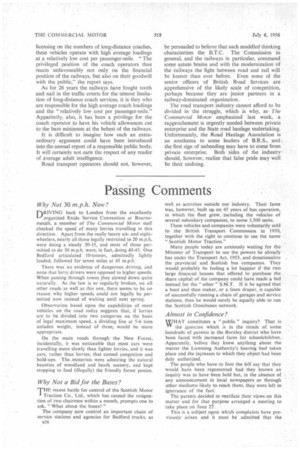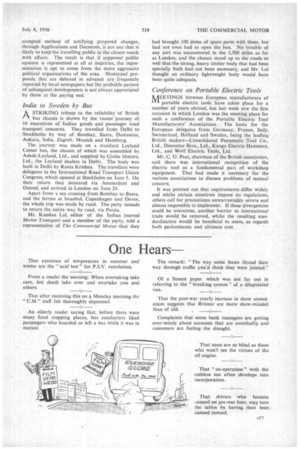Passing Comments
Page 36

Page 37

If you've noticed an error in this article please click here to report it so we can fix it.
Why Not 30 m.p.h. Now?
DRIVING back to London from the excellently organized Exide Service Convention at Bournemouth, a member of The Commercial Motor staff checked the speed of many lorries travelling in this direction. Apart from the really heavy sixand eightwheelers, nearly all those legally restricted to 20 m.p.h. were doing a steady 30-35, and most of those permitted to do 30 m.p.h. were, in fact, doing 40-45. One Bedford articulated 10-tanner, admittedly lightly loaded, followed for seven miles at 45 m.p.h.
There was no evidence of dangerous driving, and none that lorry drivers were opposed to higher speeds. When passing through towns they slowed down quite naturally. As the law is so regularly broken, on all other roads as well as this one, there seems to be no reason why higher speeds could not legally be permitted now instead of waiting until next spring.
Observation based upon the capabilities of most vehicles on the road today suggests that, if lorries are to be divided into two categories on the basis of legal maximum speed, a dividing line at 5-6 tons unladen weight, instead of three, would be more appropriate.
On the main roads through the New Forest, incidentally, it was noticeable that most cars were travelling more slowly than lighter lorries, and it was cars, rather than lorries, that caused congestion and hold-ups. The motorists were admiring the natural beauties of woodland and heath scenery, and kept stopping to feed (illegally) the friendly forest ponies.
Why Not a Bid for the Buses?
THE recent battle for control of the Scottish Motor Traction Co., Ltd., which has caused the resignation of two chairmen within a month, prompts one to ask, "What about the buses?"
The company now control an important chain of service stations and agencies for Bedford trucks, as 826
well as activities outside our industry. Their fame was, however, built up on 45 years of bus operation, in which the fleet grew, including the vehicles of several subsidiary companies, to some 3,500 units.
These vehicles and companies were voluntarily sold to the British Transport Commission in 1950, together with the right to continue to use the name "Scottish Motor Traction."
Many people today are anxiously waiting for the Minister of Transport to use the powers he already has under the Transport Act, 1953, and denationalize the provincial and Scottish bus companies. They would probably be feeling a lot happier if the two large financial houses that offered to purchase the share capital of the company could have made a bid instead for the " other " S.M.T. If it be agreed that a boot and shoe maker, or a linen draper, is capable of successfully running a chain of garages and service stations, then he would surely be equally able to run the Scottish Omnibuses network.
Almost in Confidence?
WHAT constitutes a " public " inquiry? That is " the question which is in the minds of some hundreds of parents in the Burnley district who have been faced with increased fares for schoolchildren. Apparently, before they knew anything about the matter the Licensing Authority's hearing had taken place and the increases to which they object had been duly authorized.
The people who have to foot the bill say that they would have been represented had they known an inquiry was to have been held but, in the absence of any announcement in local newspapers or through other mediums likely to reach them, they were left in ignorance of the fact.
The parents decided to ventilate their views on this matter and for that purpose arranged a meeting to take place on June 27.
This is a subject upon which complaints have previously arisen and it must be admitted that the accepted method of notifying proposed changes, through Applications and Decisions, is not one that is likely to keep the travelling public in the closest touch with affairs. The result is that if supposed public opinion is represented at all at inquiries, the representation is apt to come from the more aggressive political organizations of the area. Municipal proposals that are debated in advance are frequently reported by local newspapers but The probable pattern of subsequent developments is not always appreciated by those at the paying end.
India to Sweden by Bus
A STRIKING tribute to the reliability of British
bus chassis is shown by the recent journey of 16 executives of Indian goods and passenger road transport concerns. They travelled from Delhi to Stockholm by way of Bombay, Basra, Damascus, Ankara, Sofia, Zagreb, Munich and Hamburg.
The journey was made on a standard Leyland Comet bus, the chassis of which was assembled by Ashok-Leyland, Ltd., and supplied by Globe Motors, Ltd., the Leyland dealers in Delhi. The body was built in Delhi by Rama Krishna. The travellers were delegates to the International Road Transport Union Congress, which opened at Stockholm on June 5. On their return they detoured via Amsterdam and Ostend, and arrived in London on June 24.
Apart from a sea crossing from Bombay to Basra. and the ferries at Istanbul, Copenhagen and Dover, the whole trip was made by road. The party intends to return the entire way by road, via Persia.
Mr. Kundan Lal, editor of the Indian journal Motor Transport and a member of the party, told a representative of The Commercial Motor that they
had brought 100 items of spare parts with them, but had not even had to open the box. No trouble of any sort was encountered in the 5,500 miles as far as London, and the chassis stood up to the roads so well that the strong, heavy timber body that had been specially built had not been necessary, and Mr. Lal thought an ordinary lightweight body would have been quite adequate.
Conference on Portable Electric Tools
NAEETINGS between European manufacturers of ATI portable electric tools have taken place for a number of years abroad, but last week saw the first occasion in which London was the meeting place for such a conference of the Portable Electric Tool Manufacturers' Associations. The hosts for the European delegates from Germany, France, Italy, Switzerland, Holland and •Sweden, being the leading British makers—Consolidated Pneumatic Tool Co., Ltd., Desoutter Bros., Ltd., Kango Electric Hammers. Ltd., and Wolf Electric Tools, Ltd.
Mr. C. U. Peat, chairman of the British association, said there was international recognition of the electric tool as a fundamental part of workshop equipment. That had made it necessary for the various associations to discuss problems of mutual concern.
It was pointed out that requirements differ widely and whilst certain countries impose no regulations, others call for precautions unwarrantably severe and almost impossible to implement. If these divergencies could be overcome, another barrier to international trade would be removed, whilst the resulting standardization would be beneficial to users, as regards both performance and ultimate cost.
























































































































